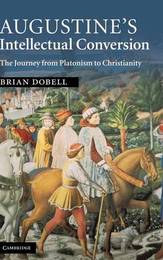
|
Augustine's Intellectual Conversion: The Journey from Platonism to Christianity
Hardback
Main Details
| Title |
Augustine's Intellectual Conversion: The Journey from Platonism to Christianity
|
| Authors and Contributors |
By (author) Brian Dobell
|
| Physical Properties |
| Format:Hardback | | Pages:270 | | Dimensions(mm): Height 229,Width 152 |
|
| Category/Genre | History of Western philosophy
Western philosophy - Ancient to c 500
Philosophy of religion
Christianity |
|---|
| ISBN/Barcode |
9780521513395
|
| Classifications | Dewey:270.2092 |
|---|
| Audience | | Professional & Vocational | |
|---|
|
Publishing Details |
| Publisher |
Cambridge University Press
|
| Imprint |
Cambridge University Press
|
| Publication Date |
5 November 2009 |
| Publication Country |
United Kingdom
|
Description
This book examines Augustine's intellectual conversion from Platonism to Christianity, as described at Confessions 7.9.13-21.27. It is widely assumed that this occurred in the summer of 386, shortly before Augustine's volitional conversion in the garden at Milan. Brian Dobell argues, however, that Augustine's intellectual conversion did not occur until the mid-390s, and develops this claim by comparing Confessions 7.9.13-21.27 with a number of important passages and themes from Augustine's early writings. He thus invites the reader to consider anew the problem of Augustine's conversion in 386: was it to Platonism or Christianity? His original and important study will be of interest to a wide range of readers in the history of philosophy and the history of theology.
Author Biography
Brian Dobell is Assistant Professor of Philosophy at the University of Balamand.
Reviews'Of the many excellent books written on Augustine's intellectual conversion in the last half century, Brian Dobell's is one at the top of my list. He argues that Confessions 7.9-27 describes a period of ten years following the garden scene and his baptism in Milan when Augustine gradually realized the difference between Platonism and Christianity and made the latter thoroughly his own. This is an excellent book for any serious student of Augustine's thought.' Roland J. Teske, S. J., Professor of Philosophy Emeritus, Marquette University
|